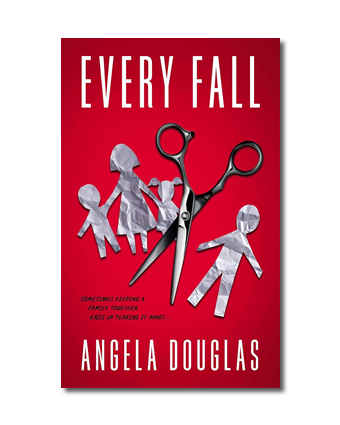“Thought provoking and atmospheric, Every Fall pulls back the curtain of the thin blue line while simultaneously exploring the isolation of early motherhood.”
– Alex Finlay, bestselling author of If Something Happens to Me
The work of the brave folks who take on some of our toughest jobs—EMTs, firefighters, police officers, paramedics—puts them under tremendous pressure. Life-threatening situations and stressful experiences are all in a day’s work.
Over 80% of first responders report experiencing a traumatic event at work.
And what about their family members and loved ones? Numerous studies have shown that loved ones may experience secondary or vicarious trauma, as well as additional challenges around protecting the family. Ongoing exposure can lead to exhaustion, worry, and hypervigilance.
In her debut novel Every Fall, Angela Douglas explores the wide-ranging effects of this trauma. The subject is close to her heart.
In Every Fall, married couple Bree and Jake grapple with the aftermath of psychological trauma. Jake’s PTSD stems from a tragic incident at work, while Bree faces postpartum depression following the birth of their second child.
The spouse of a retired police officer, Douglas drew on personal experience to shape the issues that her characters face. “They [first responders] will see things on a shift that most of us will never see in a lifetime, especially if they’re working in a crime-riddled city, which my husband did. My inspiration for writing Jake was the hope that people would have either empathy or insight into what life is like for someone who has chosen that career.”
Instead of viewing it as a weakness or personal failing, brain trauma can be considered an injury. Getting treatment for a burn or a broken bone is considered routine. So why isn’t PTSD thought of in the same way? Ongoing stigma around acknowledging and discussing mental health remains a serious problem.
Douglas was aware of this sensitivity. One of her goals in writing the novel was to portray the complexities of police culture without bias. “I aimed to open up discussions about the need for reforms and better support systems within the force.” By demonstrating raw and honest struggles, she hopes readers will recognize the importance of seeking help and the strength in vulnerability.
Support and Resources
Resources to support mental health and leadership development for law enforcement officers and their families.
Information from the Department of Veterans Affairs, including courses and links to service providers, to assist police officers, or those who train police officers, to more effectively interact with veterans who have PTSD.
Copline provides 24/7, CONFIDENTIAL services for callers who are dealing with various stressors encountered both on and off the job.
- Author Superpowers:
4 Traits All Great Authors Have - March 27, 2025 - BookTrib Spotlight:
Hannah Deitch - March 25, 2025 - Ripped from the Headlines:
The Oligarch’s Daughter - March 21, 2025











